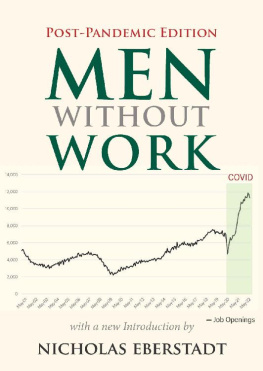First published 2000 by Transaction Publishers
Published 2017 by Routledge
2 Park Square, Milton Park, Abingdon, Oxon OX14 4RN
711 Third Avenue, New York, NY 10017, USA
Routledge is an imprint of the Taylor & Francis Group, an informa business
Copyright 2000 by Taylor & Francis.
All rights reserved. No part of this book may be reprinted or reproduced or utilised in any form or by any electronic, mechanical, or other means, now known or hereafter invented, including photocopying and recording, or in any information storage or retrieval system, without permission in writing from the publishers.
Notice:
Product or corporate names may be trademarks or registered trademarks, and are used only for identification and explanation without intent to infringe.
Library of Congress Catalog Number: 00-028703
Library of Congress Cataloging-in-Publication Data
Eberstadt, Nick, 1955
Prosperous paupers, and other population problems / by Nicholas Eberstadt.
p. cm.
Includes bibliographical references and index.
ISBN 1-56000-423-1 (alk. paper)
1. United StatesPopulation. 2. Communist countriesPopulation.
3. Population. 4. Population forecasting. I. Title.
HB3505 .E25 2000
304.6dc21 00-028703
ISBN 13: 978-1-56000-423-3 (hbk)
Acknowledgments
The essays and studies assembled in this volume were originally published in the mid- and late-1990s. Throughout that decade and most of the previous one, I pursued my research under the joint aegis of the American Enterprise Institute (AEI) in Washington, D.C., and the Harvard Center for Population and Development Studies in Cambridge, Massachusetts. This may sound like a case of dual loyalties, but it has been a most happy and rewarding endeavor for meand so it remains. Fondest thanks are dueonce againto Christopher C. De Muth, AEIs president, and to Lincoln C. Chen, longtime director of the Harvard Center, for all they have done to encourage and abet my work.
Over the years in which these chapters were written, I was aided in my diverse investigations by a succession of wonderful research assistants. I must first mention Mr. Jonathan B. Tombestireless, erudite, and gentlemanlywho often seemed to know what I would need before I knew myself. In this book, my debt to Jonathan is especially deep. I should also like to thank warmly my two other assistants during the course of these chapters: Miss Gwendolyn A. Wilber and Miss Kelly L. ONeal. In addition to their research skills, both young ladies had the knack of radiating calm and good cheer no matter what manner of chaos they were presented. With Gwen now off to make her mark in law, and Kelly hers in politics, I have no doubts that their talents will serve them both well.
I wish also to acknowledge my great appreciation to the institutions that have so generously supported this book. To the Sarah Scaife Foundationa faithful sponsor of so many of my research projectsmy special gratitude is due yet again. I should also like to thank the Earhart Foundation and the U.S. Institute of Peace for grants that permitted me to produce studies included in this volume. Finally, I would like to note that the Pfizer Corporation and the Philip M. McKenna Foundation kindly provided the funding that permitted me to complete this work.
The following chapters have been reprinted with the permission of the publishers/publications through which they originally appeared. For some of the chapters in this volume, the text has been somewhat revised, and bear new titles:
: Prosperous Paupers and Affluent Savages: The New Challenges to Social in America, Society, Jan/Feb 1996.
: Why Babies Die in D.C., Public Interest, Spring and Fall 1994.
: Daniel Patrick Moynihan, Epidemiologist, Population and Development Review, June 1997.
: Mortality and the Fate of the Communist States, in Science with a Human Face: In Honor of Roger Revelle, (Cambridge, MA: Harvard University Press,
: The Soviet Way of Death, World Affairs, Fall 1995.
: Health and Mortality in Central and Eastern Europe: Retrospect and Prospect, in The Social Legacy of Communism, (Cambridge: Cambridge University Press, 1994).
: Demographic Shocks after Communism_ Eastern Germany, 198993, Europe-AsiaStudies, May/June 1994.
: Justifying Population Control: The Latest Version, Population and DevelopmentReview, June 1995.
: Population Prospects for Eastern Asia to 2015, Johns Hopkins SAIS Policy Forum Series, November 1998.
: What If Its a World Population Implosion? Speculations about Global De-Population, Public Interest, Fall 1997.
All rights reserved.
The entire modern worldfrom the affluent United States to the poorest of the low-income regionsis beset today by a broad and alarming array of population problems. That proposition, at least, is taken as self-evident in much of our current public and intellectual discourse. Around the globe, leading scientists, academics, and political figures now attribute all manner of miseriespoverty, hunger, social tension, even political conflictto contemporary demographic trends. According to these authorities, the size, composition, and rate of growth of population routinely poses direct and major threats to human well being. That same argument further posits that a societys population problems should be addressed by interventions aimed specifically at altering its demographic rhythms.
The essays collected in this volume represent a dissent from this modern-day canon. My objection is a simple one: such thinking about population problems all too often forgets about human beings. As we will see, the very conception of population problems is inherently ambiguous and arbitrary, lending itself to faulty analysis and inappropriate diagnoses. In the following pages, I also argue that much of the prevailing thinking about population problems is plainly carelessrooted in faulty analysis and sometimes even based on the most evident of misconceptions. Such careless thinking about population problems, I submit, is a result of inattention to, or indifference toward, the fundamental unit in all populations: the individual human being.
These themes run commonly through the separate studies that comprise this book. Their correlative is the volumes recurrent finding: in the diverse settings assayed in the following eleven chapters, phenomena identified as population problems reveal themselves again and again to be, at heart, ethical problemsor ethical problems transmuted into political problems through the power of the state. In the ensuing pages, we will see this to be the case in the United States, in the territories of the Soviet bloc, in low-income regions of the globe, and for the world as a whole.
The three initial chapters focus upon what some would call the population problems of the United States. , Prosperous Paupers and Affluent Savages, examines the nature of poverty in modern America.
Ours, I argue, is a new and very modern sort of poverty, which progressive American minds from earlier generations did not anticipate. Indeed, they would hardly have imagined our current circumstances, where, in the most affluent society the world has ever known, immiseration blights millions of lives. This modern variant of immiseration, however, is rooted in individual behavior rather than strict financial need. It is characterized by the spread of criminality, illegitimacy, and dependence, and by the embrace of such practices by persons who would not, in the historic meaning of the word, be regarded as poor. Call it poverty, by all means: but the troubling social syndromes that travel under this rubric in our country today have less to do with a lack of financial resources than with a lack of moral resourcesor so my argument.













